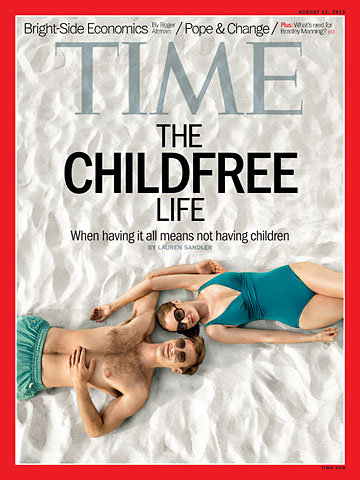
(2 of 4)
Why Don't You Have Kids?
The burden of justification tends to rest on childless women. We rarely ask, "Why do you have kids?" Instead it's "Why don't you?" One response I've heard repeated in dozens of interviews is "I keep waiting for the biological clock to tick." Another trait childless women articulate in common is a girlhood lack of interest in dolls or playing family pretend games with friends. Some can't stand the noise of kids. But many of these women have chosen to work with kids as teachers or counselors — mothering the world, so to speak — or have close relationships with friends' and siblings' children, sometimes housing them for vacations or starting up their college funds. "I love children. I just don't need to own one" is a common refrain.
The designation for women who feel at a young age that they aren't mother material and then abide by that self-knowledge is early adopters. If there is a biological explanation for this impulse, or lack of one, it has yet to be discovered. Some studies of maternal instinct have shown that it clicks in once a woman gives birth, but whether our nature leads us to conceive is another matter entirely. One researcher has controversially suggested that childless women are just smarter. At the London School of Economics, Satoshi Kanazawa has begun to present scholarship asserting that the more intelligent women are, the less likely they are to become mothers. Many peers in the field have not embraced his findings: Kanazawa analyzed the U.K.'s National Child Development Study, which followed a set of people for 50 years, and found that high intelligence correlated with early — and lifelong — adoption of childlessness. He found that among girls in the study, an increase of 15 IQ points decreased the odds of their becoming a mother by 25%. When he added controls for economics and education, the results were the same: childhood intelligence predicted childlessness.
Of course, higher IQ often leads to higher education and higher opportunity costs. It's women in that subset who are most often the ones who opt out of parenthood and who prefer to call themselves child free. "Childlessness is for someone who wants a child but doesn't have one. It's a lack. I'm not lacking anything," says Laura Carroll, author of The Baby Matrix. Laura Kipnis, a cultural critic at Northwestern University, likewise rejects defining women without kids as "-less" — as if, she says, "your life isn't going to be fulfilled without it, like there's a natural absence that once you fill it with a child, the world makes sense."
While highly educated white women continue to lead the childless numbers, the 2010 Pew study reports that other groups are catching up. Esmeralda Xochitl Flores, 34, who has written and performed a stage play on Chicano childlessness, says that in her family, motherhood is never "seen as an option. It's more of a given." Flores was born in California to a Mexican mother and a Honduran father. Her inherited cultures, she tells me, mandate that "family is your pride, your success." In fact, she notes, the whole point of the risk and upheaval of immigration is for "the generations that continue." To declare that motherhood is not for you, as Flores has, can feel like committing treason, she says — a tragedy to family members and friends, some of whom she says she doesn't see anymore. Flores, despite her adamantly child-free identity, happily cohabits with a man and his 15-year-old daughter. She says the arrangement works because of how he protects her choices; having a daughter in the house "shouldn't be a reason for you to be held back from things that matter to you," he tells her, like late nights at the nonprofit where she works in operations. "I still struggle with it because I don't want to be seen as a mom," Flores admits. Still, she says, it was a victory to fall in love with a Latino man who could tolerate her position on childlessness — rare even in a college community like Pomona, Calif.
A frustrated single life is how the 30% increase in childless black women from 1994 to 2008 is explained by some academics. "One potential theory is that they're refusing to fall into a stereotype" of the unmarried black mother, says Jennifer Hickes Lundquist, a sociologist at the University of Massachusetts at Amherst who studies race and gender, adding that in her extensive studies on fertility and family formation, it's a common refrain to hear high-achieving black women mourn what they say is a dearth of similarly educated black men.
But Jena Starkes, a Web designer, says, "This doesn't have a damn thing to do with me looking for a 'good black man.'" Starkes, who shares a Manhattan apartment with her mother and a few cats, says she couldn't get through the eHarmony dating filter until she lied on her questionnaire about desiring kids. She says these days she can't really talk to her old friends, whose priorities have all shifted to the "glamorous martyrdom" of child rearing, as she calls it. Ironically, Starkes develops mommy e-commerce for a living. Motherhood, she says, is now a massive consumer base: from organic onesies and Veggie Booty to ad-heavy blogs on every aspect of maternal striving. "Before there was a mommy industry, before there was product to move, you'd never hear how it was the hardest job in the world," she says. "If it's the hardest job in the world, I'm damn happy I don't have to do it. You're not supposed to say that, but it's true."
